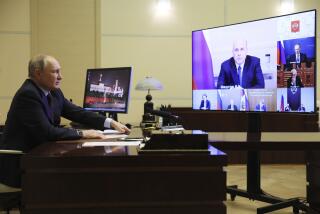U.S. nuclear accord with India signed into law
- Share via
WASHINGTON — President Bush signed legislation Monday to let America share its nuclear know-how and fuel with India even though New Delhi refuses to sign the Nuclear Nonproliferation Treaty.
The exemption to U.S. law was made in exchange for safeguards and inspections at India’s 14 civilian nuclear plants. Eight military plants, however, will remain off-limits to inspectors. The House and Senate had overwhelmingly approved the bill.
Critics worry that the agreement could spark a nuclear arms race in Asia by allowing India to redirect its atomic fuel to weapons production. They also argue that the measure undermines international efforts to prevent states such as Iran and North Korea from acquiring nuclear arms.
The White House said it was willing to make an exception for India, the world’s largest democracy, because the country had protected its nuclear technology and not been a proliferator.
The Bush administration also argued it was a good deal because it would yield information about India’s civilian nuclear program.
Bush said the law would make it possible for India, the world’s fifth-largest consumer of energy, to reduce emissions and improve its environment. India, whose demand for electricity is expected to double by 2015, produces nearly 70% of its electricity by burning coal, which leads to air pollution and greenhouse gases.
“By helping India expand its use of safe nuclear energy, this bill lays the foundation for a new strategic partnership between our two nations that will help ease India’s demands for fossil fuels and ease pressure on global markets,” Bush said in a bill-signing ceremony.
The deal also could be a boon for American companies that have been barred from selling reactors and material to India.
Before civil nuclear trade can begin, several hurdles must be dealt with. U.S. and Indian officials need to work out a technical nuclear cooperation agreement, expected to be finished next year. The two countries must also obtain an exception for India in the rules of the Nuclear Suppliers Group, an assembly of nations that export nuclear material, and Indian officials must negotiate a safeguard agreement with the International Atomic Energy Agency.
More to Read
Sign up for Essential California
The most important California stories and recommendations in your inbox every morning.
You may occasionally receive promotional content from the Los Angeles Times.













